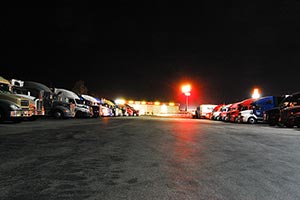Truck Parking Shortage Pits Washington Town Against Truckers

At the sprawling truck stop just off Interstate 90 in North Bend, Washington, the drivers of big rigs line up to refuel, pause for federally mandated rest breaks, take showers and grab hot meals.
Tracy Giffin, who drives a 75-foot semi-truck out of Idaho, stopped recently between dropping off a load of cargo-handling equipment at Sea-Tac Airport and picking up Genie scissor lifts bound for Montana and Canada.
Giffin said that by late afternoon, the 140 parking spaces at the privately owned Truck Town would be filled and tractor-trailers would begin lining up on the I-90 on- and offramps and along the city street in between.
About 900 trucks use Exit 34 daily, according to the city. When Snoqualmie Pass closes here because of avalanche control or road conditions, another 300 to 400 stranded trucks park along the freeway.
“They do not have enough truck parking here,” said Giffin. “If they could handle 400 trucks, they’d probably fill up every night.”
Now the city of North Bend is considering banning truck parking from its streets and prohibiting any new truck service centers or expansion of the existing truck stop, a move state officials say could exacerbate a regional problem.
An interim ordinance has been in effect for two years and “No Truck Parking” signs are common around town.
The City Council will consider making the ordinance permanent at its April 5 meeting. No applications have been submitted to expand the truck stop, but officials say they’ve had inquiries.
City officials cite concerns about noise, exhaust, traffic and the heavy rigs’ wear and tear on streets. They agree adequate truck parking is a problem and say they’ll always allow trucks to park in town when the pass is closed.
But they say one town of 6,400 in the Cascade foothills shouldn’t have to shoulder all the costs and adverse impacts of a regional commercial truck parking shortage.
And they point to the city’s vision statement that North Bend, with its proximity to Mount Si and the Middle Fork of the Snoqualmie River, become “the premiere outdoor adventure destination in the Puget Sound region.”
“What citizens want us to do is preserve the rural character, preserve the natural beauty, preserve the small-town scale. Is it [the expansion of Truck Town] doing those three things? The answer is no,” said City Administrator Londi Lindell.
The city’s stance has angered the trucking community, which notes that Truck Town is the only full-service truck stop between Ellensburg and Seattle and one of only three in King County. The other two, in Federal Way and Kent, have just 35 parking spaces between them.
“Where are they supposed to go to the bathroom? Where are they supposed to sleep? It’s not safe for the drivers to be parked all night along the interstate. Why not give them a place to park?” asked Joyce Hidma, a North Bend resident whose husband, Carl, drives longhaul trucks.
One of the city’s planning commissioners also has reservations about the proposed ban. Dick Ryon, a retired manager for Weyerhaeuser’s Cascades forestry operations, said the company’s business depended on logging trucks.
“This has always been a blue-collar town,” he said. “We’re turning our backs on blue-collar people.” He said North Bend could develop a world-class truck-service facility and support both the freight industry and the local economy.
Still, Ryon was part of the unanimous commission vote to forward the proposed ban to the City Council. He said he ultimately was convinced the problem was a regional one and couldn’t be solved without state and federal cooperation and funding.
“There’s a bigger problem of freight mobility for the entire state of Washington,” he said.
Supporters of Truck Town say that serving travelers and truck drivers is also a part of North Bend’s character and history. Ken and Dori Rogers founded their North Bend cafe in 1941 and moved in the early 1960s to Johnny’s Truck Stop on Highway 10, which they later bought. When the state built I-90, the couple moved the business just east of Exit 34 and rebuilt the facilities, including a restaurant, gas station and garage.
Gaynel Gunderson, the couple’s daughter, said her father had polio and couldn’t serve in World War II. He tried to help servicemen traveling over the pass by giving them a hot meal and rides from passing trucks. The truckers were always happy to help, she said, and her father developed an appreciation for their work hauling essential goods across the country and to small outposts like North Bend.
The family operated Truck Town for more than 50 years before selling it to TravelCenters of America in 2001. The family still owns the land. Gunderson said North Bend Mayor Ken Hearing encouraged them to support North Bend’s annexation of the site in 2010 and told them they’d always have the city’s support.
“Not only are they targeting us and our right to do business, they’re targeting truckers as individuals,” she said. “They have a right to a meal and a safe place to pull into and park.”
Hearing, who is serving his fourth term as mayor, said building additional truck parking would not bring in as much tax revenue to the city as locating an office park or a company headquarters on the same acreage.
Hearing said he and other city leaders have tried repeatedly over the past decade to get help on the parking needs from the state, the ports of Seattle, Tacoma and Everett, the Federal Highway Administration, U.S. Reps. Dave Reichert and Suzan DelBene and many state officials.
But he said no one took responsibility for helping the city find answers. “It was like a comedy where everybody is pointing at each other and saying, ‘It’s not my problem,’ ” Hearing said.
The mayor said he is not anti-trucks. “I don’t have a problem with trucks. We survive with trucks. I appreciate the truck drivers, but we have a problem with parking and we can’t solve it ourselves.”
Ron Pate, interim freight director for the Washington State Department of Transportation, said the agency has just started a statewide strategic truck-parking plan and hopes to complete it within a year. In the meantime, he said, the state will continue to try to look for ways to add commercial parking along the I-90 corridor in partnership with the trucking community and local jurisdictions.
He said he hoped North Bend’s solution to its problem would not be to force parking onto I-90. “That’s not the best option for the safety of truckers or for the state. I’m very concerned that they could be making it worse. Let’s have a conversation,” Pate said.



